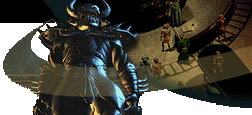Design
This page describes what Bioware intended with their implimentation of multiplayer in Baldur's Gate: to simulate a pen and paper session from their youth.
For Baldur's Gate, Bioware decided to try a novel multiplayer design. They wanted to recreate the feeling of sitting around a kitchen table playing an Advanced Dungeons & Dragons module. Up to six people can create and control characters in a cooperative jaunt through the story, which is exactly the same as the single player version. If desired, each player can control more than one character, although each character can only be controlled by one person.
The multiplayer game is initiated by a host and the other players then connect to the host computer. The first character the host creates normally becomes the story's protagonist. Just like in single player, if the protagonist dies, the game must be reloaded or restarted. The leader of the adventuring party is the individual at the top of the portrait stack at the right side of the screen. The leader does not have to be the protagonist or a character controlled by the host. During the course of the game, which players control which characters can be changed easily and players can even control NPCs that have joined the party. To allow you to use your character in different games, the character can be exported to the player's computer (except for NPCs), but they also remain part of the saved game file on the host's machine. To change hosts, this saved game must be emailed to the new host.
While player versus player combat is possible ("Player Killing"), the game is designed towards cooperation. Baldur's Gate is a very long game so traveling with like minded adventurer's is more fun and effective. The multiplayer game can be saved so that you can continue at a later date and prevents the loss of much time and possessions in the event of a player killer entering and ruining your open game. It is possible to password protect the game and/or close the game to joining requests from new people. As you can export your character, a suggestion has been to set up "arenas" where people could go one on one or party against party (up to six people maximum from both sides) in friendly matches. There are no specific places in Baldur's Gate to do this, but any saved game location or even CandleKeep where you start could serve as the coliseum.
The multiplayer game works slightly differently than the single player game. For perspectives on the design issues, refer to these posts by James Ohlen (Lead Designer) and Don Yakielashek (Senior Programmer).
1) All characters must remain in the same area (of the world map) and they must all be present before it will let a new area be loaded. Players can break off from the group to explore houses and other buildings individually because they are part of the area.
2) Whenever dialog is initiated or characters buy/sell in a store or temple, all players must watch the proceedings. Only the person that initiates the event has control over the responses so this may require some getting used to for people that have played Diablo, for instance. This setup is necessary so that no player misses plot developments and prevents disturbing occurrences, such as player 1 killing the merchant while player 2 is bartering. During dialogue mode all players are paused. Notice in the screenshot, only the person that is able to talk is shown at the right.
3) Accessing the inventory screen does not unpause the game in multiplayer like it does in single player.
4) There is a chat window available to talk to the other players and organize the party's actions. Private messages can be whispered by typing the name of the person to which it is directed followed by a colon ":" and the message's text.
|

